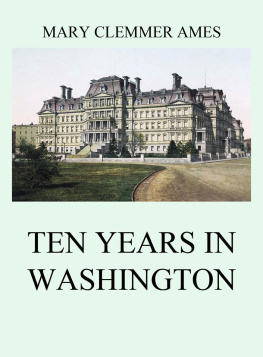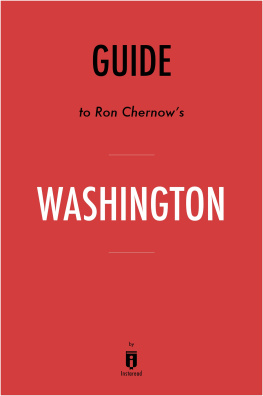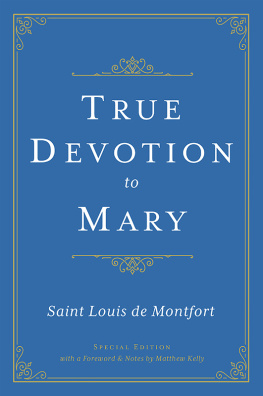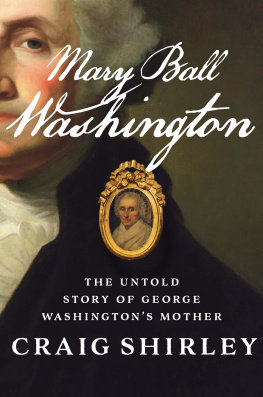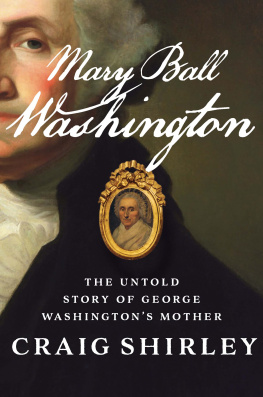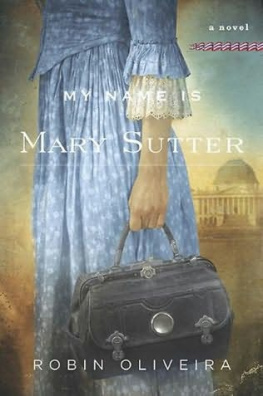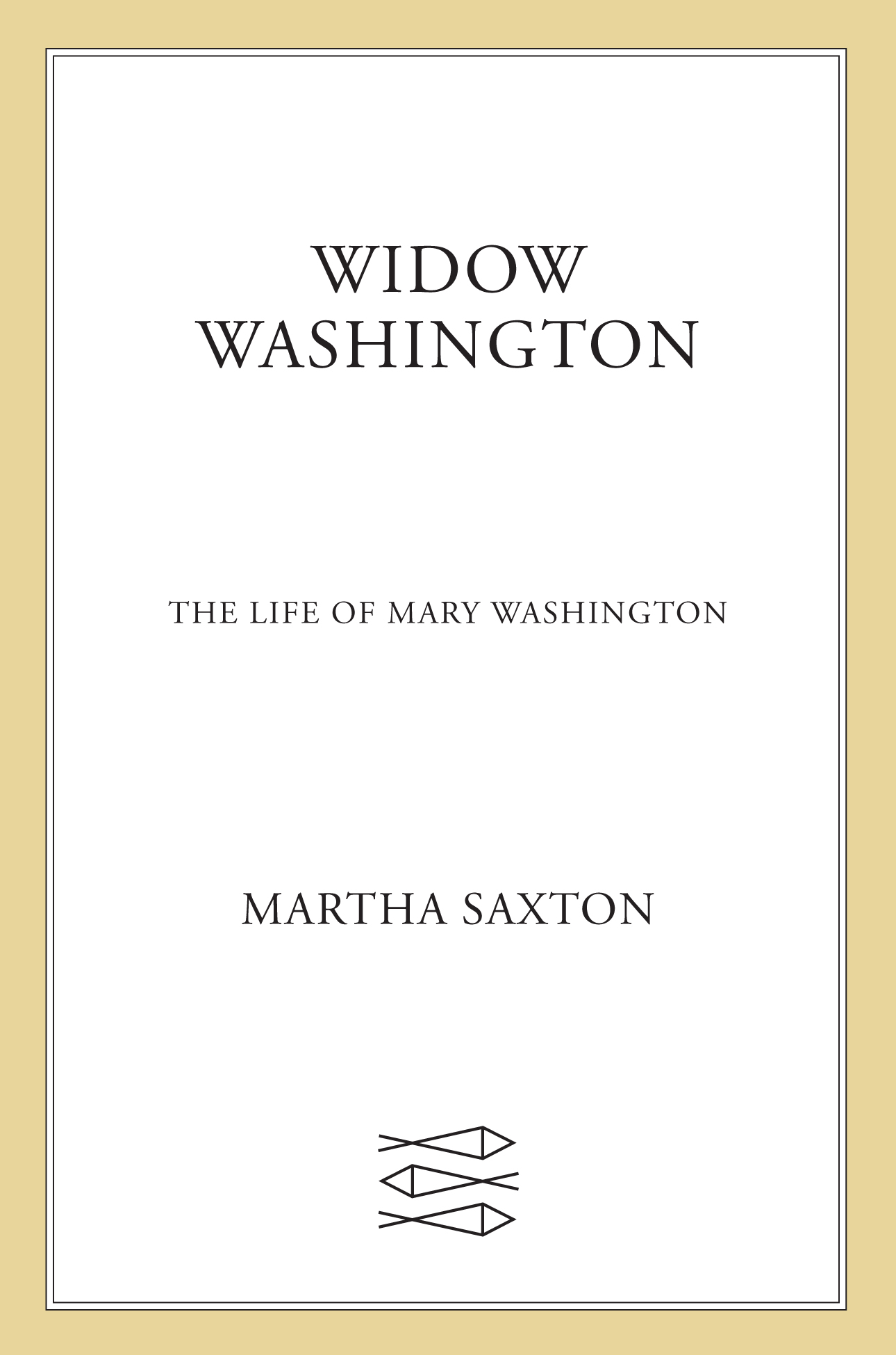The author and publisher have provided this e-book to you for your personal use only. You may not make this e-book publicly available in any way. Copyright infringement is against the law. If you believe the copy of this e-book you are reading infringes on the authors copyright, please notify the publisher at: us.macmillanusa.com/piracy.
A contemporary Russian saying claims that the past has become much more unpredictable than the future.
SVETLANA BOYM, THE FUTURE OF NOSTALGIA
MARY BALL WASHINGTON WAS ORPHANED early, grew up poor, and was later widowed with five children under the age of twelve to support. She did the best she knew how for her family in the harsh world of the eighteenth-century Chesapeake. She poured her exceptional vitality, deep religious convictions, and unflagging persistence into her first son, George. We still admire him for the honorable way he used those qualities to create a country and a government. Why has she not received historians respect for her years of lonely and challenging work?
Since her death in 1789, the Founders mother has endured a tumultuous half-life. George Washingtons first chroniclers extolled her as the pious and self-sacrificing mother of the sainted president. President Andrew Jackson praised her richly at a ceremony to lay the cornerstone for a monument planned for her. But after the Civil War, she started a steep descent in the esteem of her sons scholars. By the mid-twentieth century, she had become unloving, jealous, whiny, and greedy. That monument was never erected.
The caricature of an incompetent, crude, imperious, selfish, and unloving woman flowered fully in the 1940s and 50s with Douglas Southall Freemans massively detailed six-volume work. In James Flexners Pulitzer Prizewinning Indispensable Man, the author called her a termagant. Most recently, Ron Chernow described Mary as crude, illiterate, self-centered, and slovenly. In the index to his biography of Washington, subcategories for Mary include critical nature of, stubborn and difficult personality of, and thwarting of GWs career attempted by. (Martha, by contrast, merits the entries kindness and generosity of, strength and practical nature of, support and devotion of.)
As I read George Washingtons biographers shape-shifting accounts of his mother, my confusion gave way to anger. I have spent my life studying and writing North American womens history to try to retrieve some of what has been lost, to try to replace incomprehension or criticism with historical context, and to substitute evidence for stereotypes and sentiment. I research and write to try to be fair to women whom historians have ignored or misjudged. Mary had clearly suffered from egregiously unfair treatment.
I am normally not drawn to write about women whose fame derives from men or about slaveholding women. But the double standards many historians used in judging mother and son and more than a century of gratuitous hostility toward Mary called out to me for a response. Trying to be fair to a slave-owning woman was a complicated challenge, as complicated as our nations history. It was a challenge analogous to those historians in the past had faced in writing about her, at which I felt they had largely failed. They did not like her style of mothering and of womanliness. I had to try to see what kind of a mother she really was, and what kind of a woman. I didnt like her ownership of slaves. I had to try to understand it: what it meant for her slaves, for her, and for her children.
Mary Washington had the singular destiny to have a son whose potential for being idealized seems to have been even greater than that for motherhood. Maternal stereotypes into which historians slotted Mary in the absence of evidence have become darker and more complex over the centuries. Maintaining George Washingtons elevated reputation has come at the cost of his mothers, because it has seemed to his scholars to be a zero-sum game. She has been the object of both meaningless praise and, more often, antagonism from writers who dreamed of a different mother for their hero George.
Since her death, politicians and historians have used their idea of her to make a wild assortment of arguments. Of course, she was instrumental in early hagiography about George. Then, when stereotypes about mothers became less rosy and evidence of Georges intermittent irritation with Mary emerged, a now-nasty mother served to show how George bravely managed to escape her (with his heterosexuality intact) to fight the British and found the nation. Implicit in this view was that the Founding Father (and the nation) didnt really need a mother, but a bad one would serve, too. Along the way, she has also served for white supremacists as a reminder of the good white stock from which good Americans must come. And she has served, erroneously, as an example of a loving mistress of slaves. Marys memory (the one where she is a prop in Georges hagiography) served as a rallying cause for women in the late nineteenth century to try to soften North-South animosity.
The ways in which Mary Washingtons life had been used with little or no attention to her actual experiences and choices distressed me as a historian and a feminist. They motivated me to try to find out as much as I could about who she was. Perhaps she could finally tell us something about the world in which she lived and how she raised her children, including her famous son.
Understanding Mary Washingtons life requires disassembling old assumptions and constructing a new story about her that will have some stability. Most scholars have used only the handful of readily available but ambiguous sources about her. They consist of evidence of her unwillingness to let her son George enter the British navy at fourteen; letters from George telling her that he was called to military service by his colony and criticizing her reluctance to see him serve; and letters in which he complained about her asking him for money.
I first stumbled over mother and son when I was doing research on eighteenth-century widows in the Chesapeake. In that society, white widowed mothers and their firstborns were often at odds over land, money, slaves, timber, and other valuables. Husbands typically left their widows use of their propertyor some portion of itbut only during their lifetimes, or in the case of Mary Washington for a limited number of years. Her husbands will also threatened her with losing custody of the children if she remarried and was found to be not fulfilling her duties as proper guardian of their property. Legally, a widows role was to be transmitter of property from man to man.
As a consequence, the inheritance laws of early Virginia built ill will between inheriting widows and their oldest sons. Laws reinforced the belief that women should not own land or run farms and plantations. Adult sons were likely to see their mothers possession of family land as illegitimate and often acted on that perception.
The annoyance George expressed about his mothers requests for money seemed to me to be connected to the inherent widows dilemma in Virginia. I was willing to believe, as her critics said, that she might not have run her farm profitably, but that was hardly unusual for a man or woman in mid-eighteenth-century Virginia. I could imagine that she was a brusque person, distracted by the labor of raising both crops and five children, but the antagonism scholars directed at her continued to surprise me.


